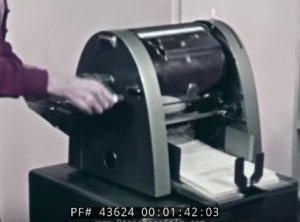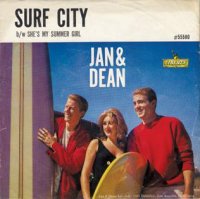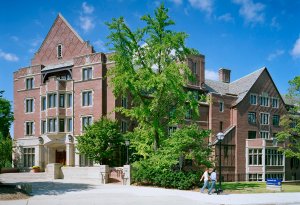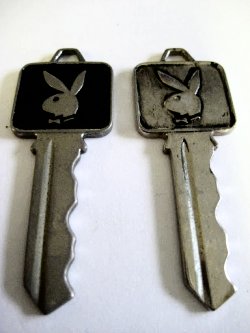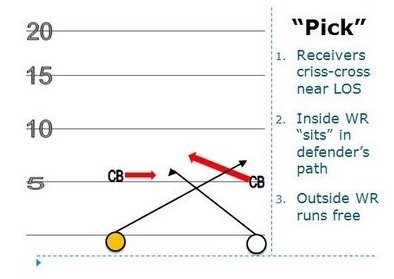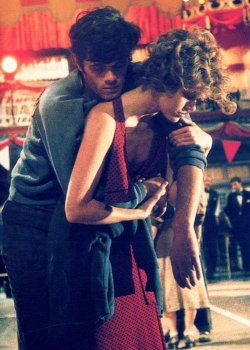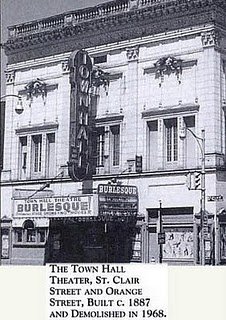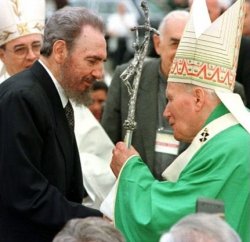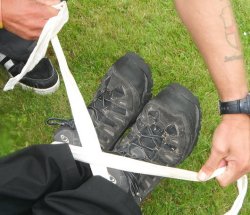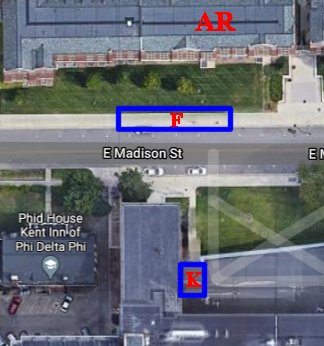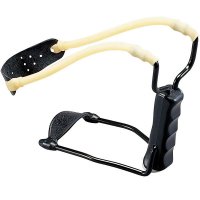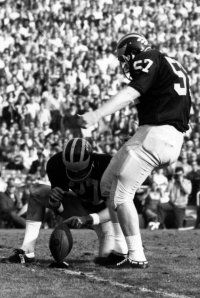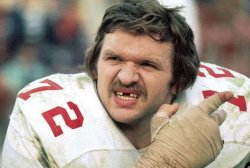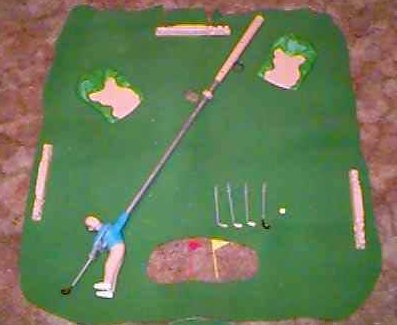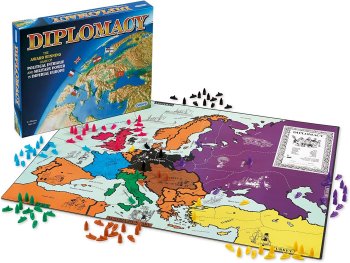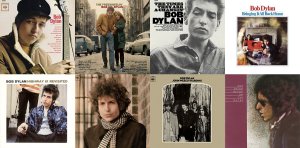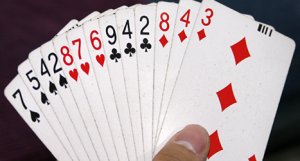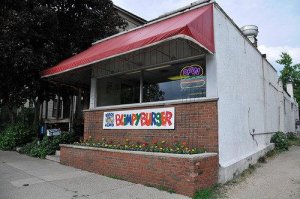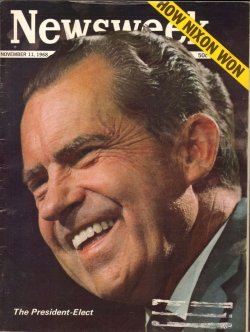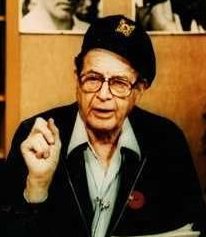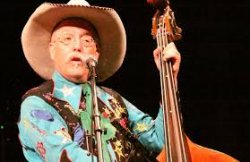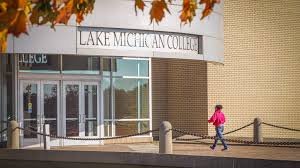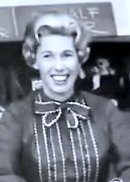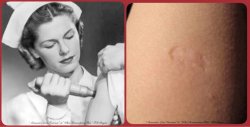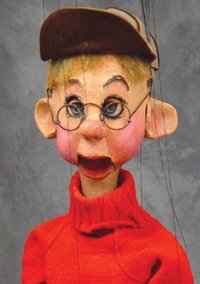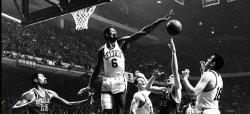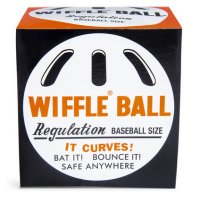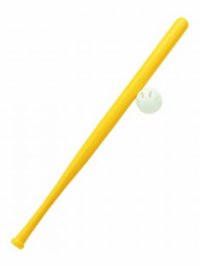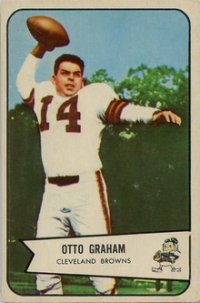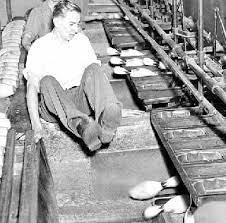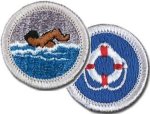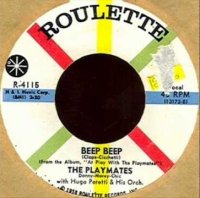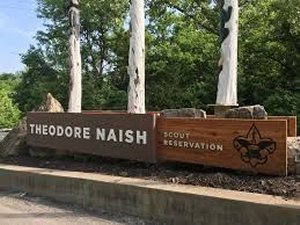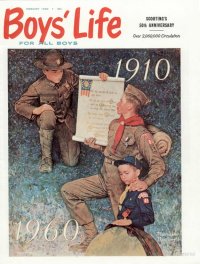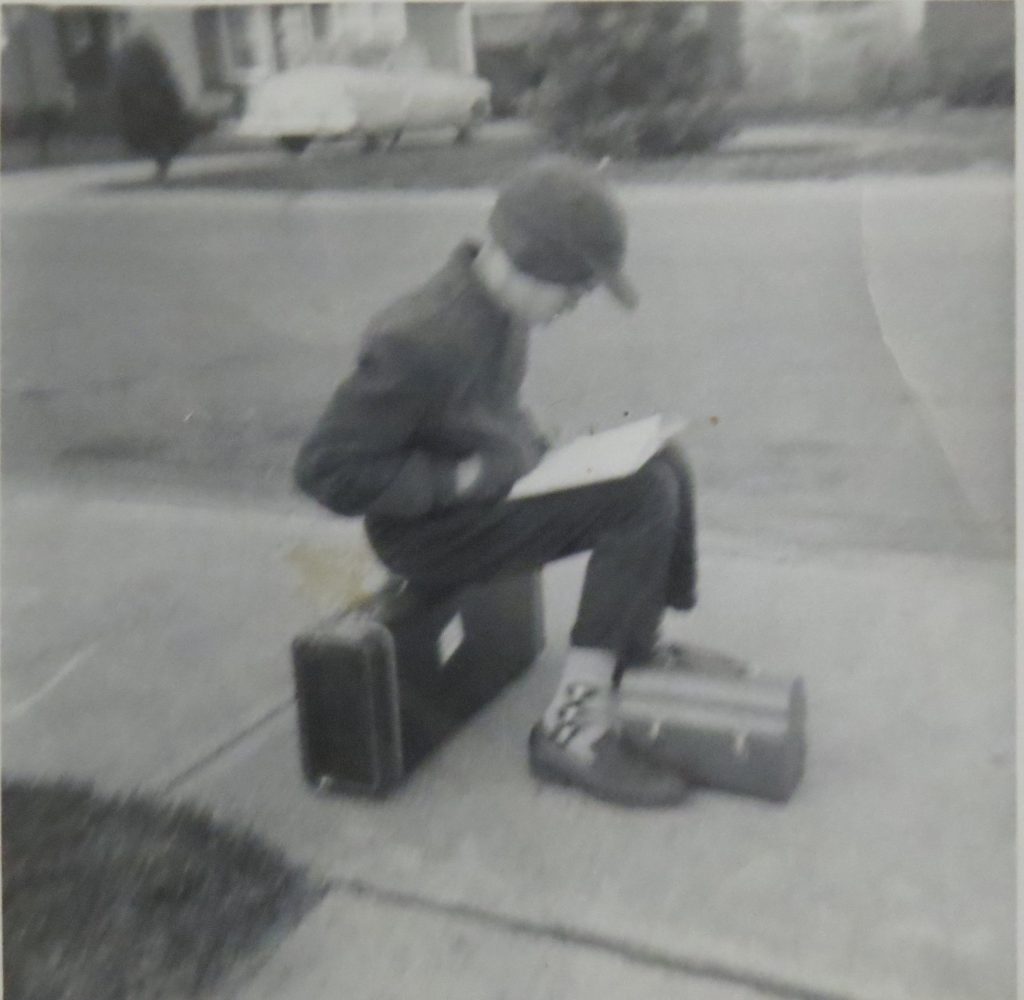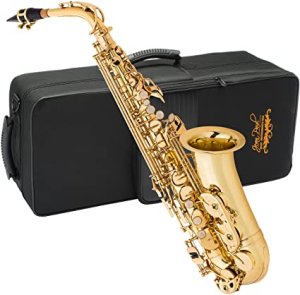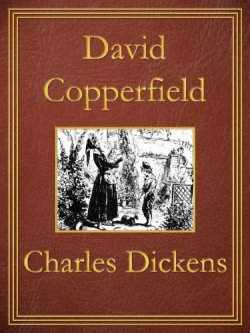Events and activities in the Hartford area. Continue reading
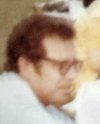
Shortly after my arrival in Hartford I, as well as all of the other actuaries and actuarial students, was invited to a party at the home of Don Sondergeld, Vice President and Actuary of the Hartford Life. In those days everyone in the corporate world knew that parties thrown by actuaries rapidly morphed into raucous bacchanalia. They were rivaled only by accountants and undertakers in this regard.
In my whole life I had attended only a few parties, and I had most certainly never been to a fairly elegant one sponsored by my boss’s boss. I was clueless about behavior at such functions. I definitely made at least one gigantic faux pas. Mrs. Sondergeld asked me where I was from, and I answered, “The Kansas City area.” She then asked me if we could see the Rocky Mountains from there.
Having suppressed a chuckle, informed her that KC was about six hundred miles from the Rockies. So far, so good. I then asked her if she thought she would be able to see from Hartford a mountain range in the Detroit area. I don’t recall her answer, but Ithe expression on her face is indelibly etched in my memory.
In my defense, I had not yet come to appreciate how geographically challenged people in the northeastern United States were. When I arrived in Ann Arbor, I had been shocked to hear Michiganders referring to themselves as Midwesterners. When they asked me where I was from, I said the southeast. After all, I lived all my life in the Kansas City area, which is east and a little south of the geographic center of the contiguous states (a couple of miles north of Lebanon, KS).
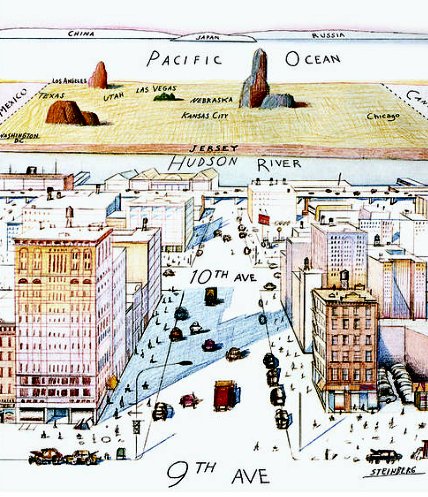
In 1972 I had not yet seen Steinberg’s New Yorker cartoon, which makes it clear that from the perspective of residents of New York (and, I would add, New England) Kansas City is no farther from the towering Rocky Mountains than Jersey is from Manhattan.
Also, let the record to show that my societal debut in New England was not an abject failure. I spent the entire evening in the Sondergeld abode without spilling any wine on the carpet. I also did not break any precious china or figurines. I started no fights with other actuaries, and I set no fires.
My dad visited me in the Fall of 1972. He had been in New York City for business, and he took the Amtrak train to the Hartford station. It must have been on a Friday. I picked him up in the evening, and he stayed at my apartment for a night or two. I remember that I tried to fix Steak Diane for him. It was not horrible, but I was a little disappointed.
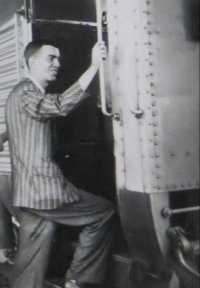
I was often nervous around my dad, but so was everyone else. He had many habits that made people uneasy, including looking at his watch every ten or fifteen minutes—usually while someone else was talking. If you asked him, he would deny it, but he also seemed quite judgmental to me.
I knew about this visit ahead of time, and I had been dreading it. I took him for a ride in Greenie in order to show him something. Maybe we went to a restaurant for lunch. I stopped at the Gulf station on Main St. in East Hartford. After the attendant filled the tank, I swear that I carefully looked both ways before attempting a left turn while exiting the station. Nevertheless, Greenie plowed into the left side of a passing grey sedan that I had somehow missed.
I had handled a few automobile accidents as an MP in the Army and had filled out the paperwork on dozens of others. I knew that in a minor situation where no one was hurt, the first priority was to get the cars pulled over to allow traffic to flow. I made sure that the road was clear before I called the police. The collision was clearly my fault, but the officer who handled the accident did not even issuee me a warning. I was grateful but shocked. The policy of the MP Company at Sandia Base had been to issue at least one ticket in every accident. I have no idea why this cop let me slide.
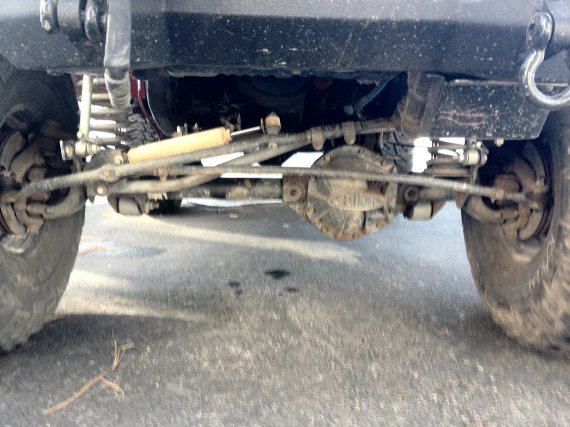
I had insurance, of course, that paid for the body work on both cars. However, when, a few months later, I brought Greenie to the DMV for the inspection required to transfer its registration from Kansas to Connecticut, it did not pass. I never experienced a problem, but the machine reported that something was wrong with the steering.
I drove Greenie to a local garage on Christmas Eve. I don’t remember whether I had an appointment, but I know that for several hours I waited for my car to get to the front of the line. It was past closing time, but the manager was aware that I had been there for a long time. All the employees had gone home when he put Greenie on the lift and determined that the tie rod on the right side was bent. The people who fixed the car originally evidently did not notice this. He informed me that he would have to order the part.
I told him that I needed to get this fixed quickly to get my car registered, and I needed my car for work. He said “OK. Give me a minute.”
When he came back he told me that he had carefully hammered it back into position. He also told me not to tell anyone what he did. I was greatly relieved. When I asked him what I owed him, he just replied “Merry Christmas.” It definitely was.
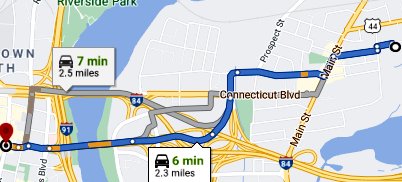
Commuting to and from my apartment in East Hartford to work at the Hartford was very easy. In the morning I just got on the Governors St. entrance to I-84, stayed to the right1, and got off at the Asylum St. exit. Parking was free (or at least cheap) at the Hartford, and it was rather easy for early arrivals like myself to find a good spot. The return trip was almost as easy as the morning drive, but sometimes the traffic would back up on Broad St. near the entrance to the highway.
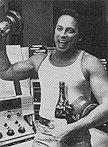
On February 1, 1974, my morning commutes became a lot more pleasant. I really enjoyed listening to the Greaseman on WPOP for the last six months that I was working at the Hartford. I tried to interest others in his morning show, but he never became a big star in Hartford. WPOP changed its format to news/talk in 1975 and sent the Greaseman packing.
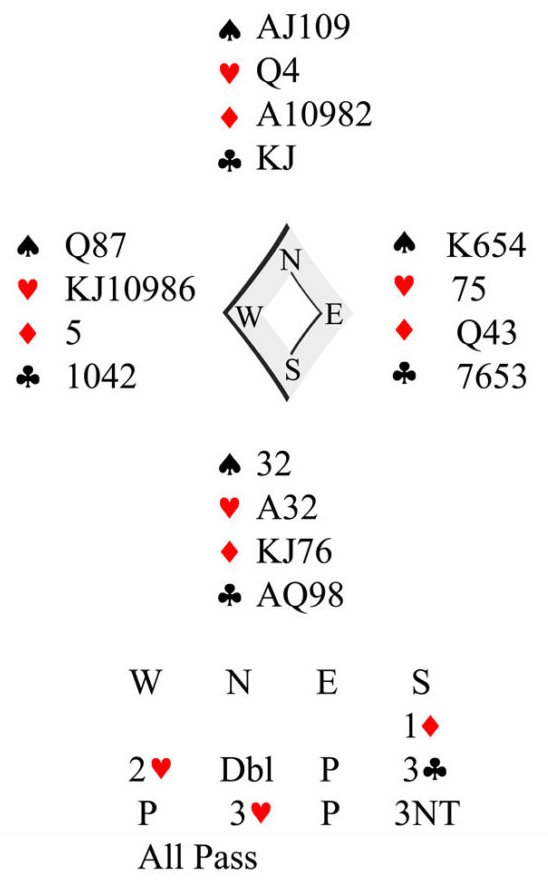
Most of the time that I was in Hartford I had quite a bit “on my plate”, but I definitely would have preferred to play more bridge. As I recall, the Hartford sponsored a weekly sanctioned game in the evening. John Sigler and I played in it once or twice. I think that we finished second once. The director played in the game. When we played against him, I asked him about one of his partner’s bids, he said that it was “probably sort of a western cue bid.” This explanation would not suffice in the twenty-first century, but what was my recourse? Call the director?
The Hartford Bridge Club2 existed in 1972. Quite a few actuaries played there, but I never found out about it. Donna Feir, the club’s manager in the twenty-first century, assured me that I would not have liked it because many players were quite rude. I am not sure that that would have deterred me at all. If I could have found a place to play with high-level competition and a partner who was willing to work with me to develop a bidding system, my subsequent life may have changed drastically.
Most of the social life among my friends in the Hartford area revolved around sports. These activities are covered rather thoroughly here and here. There were also regular gatherings at a few local watering holes3 . I remember a few of them pretty well.
- The bar at the Shoreham Hotel was the default gathering spot every Friday after work. Its main attraction was its convenient location right across Asylum St. from the Hartford. They served strange little puffy things to munch on. They came in various colors, none of which was commonly found in nature. Occasionally one of the bosses, Don Sondergeld or Don Francis, would join us. I remember that Sondergeld once regaled us with a tale about a group of actuaries on a expense accounts who ordered an outlandish meal in New York City. I don’t recall the details, but the punchline was, “Why such a niggardly tip?”
- The White Swan Café on Park Street was another favorite hangout. Every table was provided with an endless supply of free peanuts. Customers were required to throw shells on the floor. If you set any down on the table, the waitress would unceremoniously brush them off.
- I can only remember going to Fast Eddie’s on the Berlin Turnpike a few times. The most memorable one was August 17, 1973, my twenty-fifth birthday, which is described here.
- I went to the House of Zodiac (a.k.a. the “Zoo”), a nightclub on Farmington Ave. in West Hartford, exactly once. Herget and a few other guys liked to go there on Fridays after the mandatory appearance at the Shoreham. On the way to the Zoo Tom generally stopped at a liquor store (locally called a “packy”) to purchase some cold beer in bottles. He always chose a brand that they sold at the Zoo. When he arrived at the club, he bought a bottle of the same brand at the bar and asked for a glass. Thereafter he refilled the glass from his private supply stashed in various pockets. This place was noisy and crowded. The only reason to go was if you were hoping to pick someone up. Conversation was impossible.
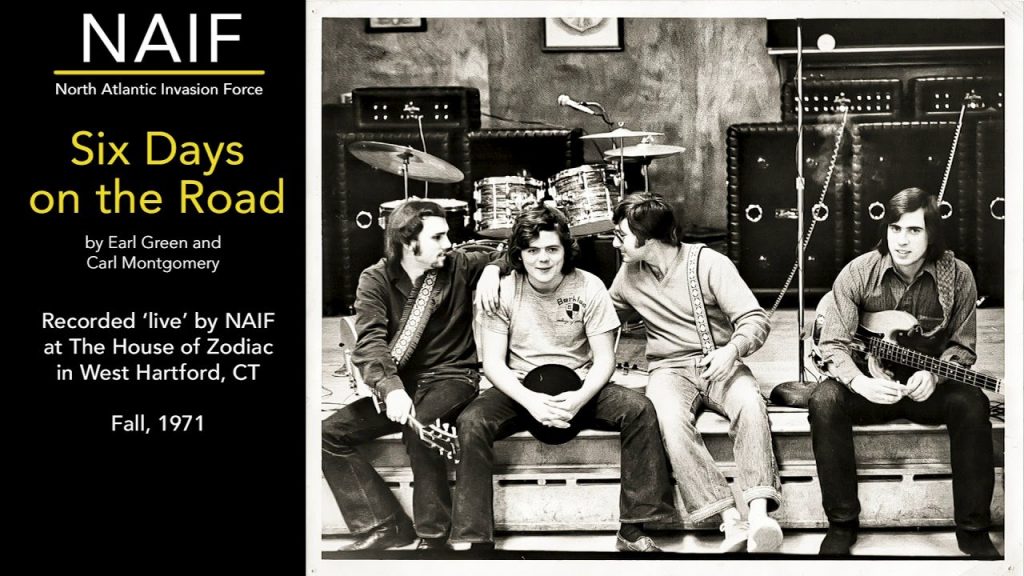
The other major social activity that I remember was helping people move from one house or apartment to another. I am pretty sure that I helped Chris and Carolyn DesRochers move into a new house. Those organizing the moving were expected to provide beer and pizza to the laborers. I seem to remember that the DesRochers set the gold standard for treating the helpers right.

I also helped Scott Otermat when he moved from Andover to Bristol. I was in the U-Haul truck when Scott picked it up. Our first stop was at a Dunkin Donuts drive-through window where Scott bought some donuts. The truck scraped against something—a sign or concrete awning, I think—before we got one stick of furniture into it. I confess that my first reaction was relief that Scott had been driving and not I. It also brought to mind the “Adventures in Moving” slogan, which I have long thought was the worst catchphrase of all time.
Scott hardly ever got upset, and this was no exception. I don’t know how much he had to pay for the accident. Maybe the U-Haul place did not really care. Would you care if a truck you were moving furniture in was scratched? I wouldn’t. It’s not as if you plan to take it to the prom.
I have twice been accused of putting scratches on passenger cars that I rented (once on Maui on vacation and once in Pittsburgh on business), but in neither case did the rental company insist on me or my insurance company paying. In fact, Avis wrote me a letter to apologize about the accusation in Pittsburgh. On the other hand, I am pretty sure that Sue’s friend from her dancing days, Sandy Tsiartas, told us that she was charged several hundred dollars when she got in an accident with a rental from an off-brand company in Florida.
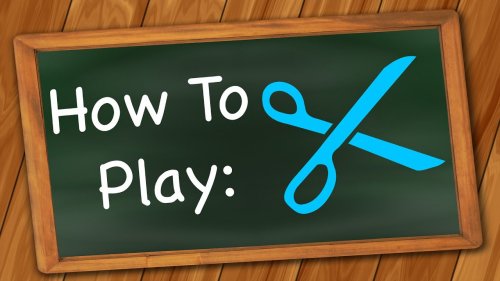
I probably attended several parties after the fiasco at the Sondergeld home during those two years in Connecticut, but I only remember a couple. One was a fête sponsored by a female actuarial student who passed the last exam to become a Fellow of the Society of Actuaries—Barb Bednarz or Pat Adams (I don’t remember which). The honoree lived with her husband way to the East of Hartford. The only thing that I remember is that I led a game of Scissors4 which went on a lot longer than one would think among such smart people.
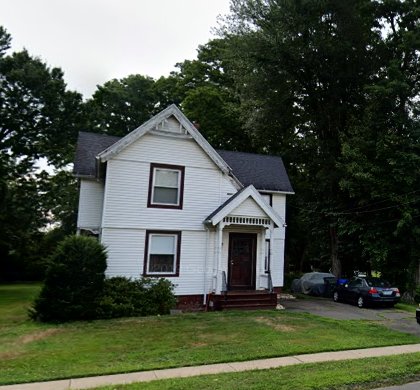
In August of 1973 I moved into the house at 345 Middletown Ave. in Wethersfield—the legendary 345 Club. Tom Corcoran and Tom Herget were my housemates. I had my own bedroom on the second floor. Somehow I obtained a used box springs and mattress that, thank goodness, had no bed bugs. I don’t recall that my bedroom had any other furniture.
At that point in my life I could still pack everything that I owned into Greenie. I didn’t even ask for help in moving. So, one Saturday morning I resided in East Hartford. By noon that day I was fully moved into the 345 Club. It was the best possible place for three young guys to live.
- There was plenty of yard space for parking cars. Corcoran had “parked” his yellow Barracuda fastback on the right side not far from the front door. I don’t know what was wrong with it. Although it was not drivable, its gigantic rear window made it a great greenhouse. Herget planted gourds in it, and they thrived, even in the winter.
- The entire front yard was considered a parking lot. It was not unusual to see six or seven cars in it.
- Tom C. had a pet beagle named Cory. While Tom was at work or just out, Cory stayed on the back porch. Tom laid down papers for him in case he had to do his business, which was every day. Everyone but Tom avoided that porch.
- Each of us had a bedroom upstairs with a door that had a working latch.
- There were at least two refrigerators, one in the kitchen and one upstairs. Each was reliably stocked with beer. The one on the second floor had been painted by Tom C. in the manner of a lusty adventure featuring swordplay and sorcery .
- On the first floor were a living room, a dining room, the kitchen, and maybe another underused room or two. Tom H. had furnished the place from second-hand stores on Park St. Except for the TV and stereo, the style might be described as Early Grandmother.
- The back yard was pretty large. A railroad track that was no longer used. There was a shed back there that made for some interesting shots in the obstacle croquet games.
- Best of all, the landlord was blind!
There was one small drawback to living in the 345 Club. For some reason the electricity would fail for short periods of time. Since it seldom went out long enough for the beer to get warm, it was not considered too big a deal.
The one problem was the electric clock in the kitchen. I wore a watch at all times, and I was obsessive about keeping it accurate. So, the state of the clock was immaterial to me. The other guys were more dependent on it, but it was a nuisance to take it down, reset the time, and remount it. So, Herget simply made a sign that gave the formula for the necessary adjustment: “Add 12 minutes”, “Add 31 minutes”, “Add 2 hours and 10 minutes”, etc. He then taped the sign to the clock—good as new.
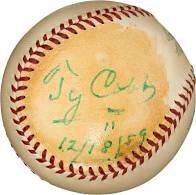
One day Cory was on the loose in the house. Somehow he got into my bedroom and made a beeline for the closet. I can’t remember if the closet had a door—probably not. Cory found my posters of the Russian revolution. His capitalist upbringing impelled him to desecrate them. He also found a baseball that my dad had given me that Ty Cobb had signed in green ink. I don’t accuse Cory of disrespect for Cobb’s batting and baserunning skills. He probably would have chewed up a ball that was signed by Honus Wagner or Cy Young just as readily.
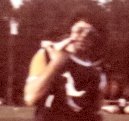
I did not get upset. I must have been careless about keeping the door completely closed. Besides, material things have never meant that much to me. Aside from when I lived in Detroit, I did not worry too much about the security of my belongings.
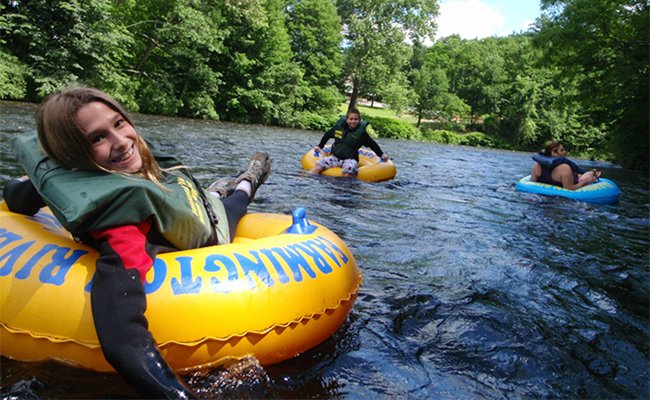
At the end of the summer of 1973 Tom H. invited me to join a group of people for tubing on the Farmington River. By the twenty-first century this has become a highly organized activity. A company rents large inner tubes at a spot pretty far upstream. They also have a downstream location where the renters return the tubes. From there a van driven by a representative of the company takes everyone back to the starting point.
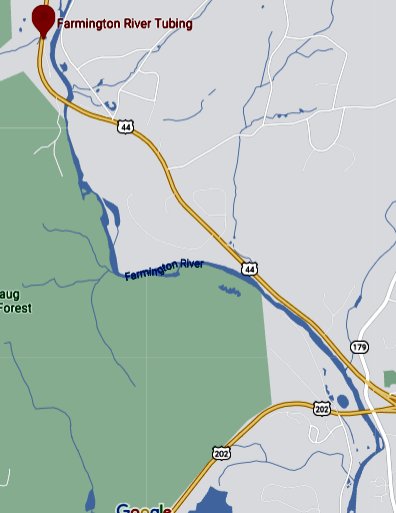
They now charge $25 per person for this service. I cannot imagine Herget paying anything close to that amount. I suspect that he rustled up some inner tubes from a farmer or trucker somewhere, and we just parked one car at the ending spot. I am pretty certain that our tubes were plain black and had no handles. I also don’t remember life preservers. The river was only a few feet deep where we were tubing.
I had a really great time. The sun was out, and in those days I could sit and bake in the sun all day long with no repercussions. For most of the journey we just sat on our tubes and drank beer from cans balanced on our bellies while moving very slowly downstream. The whole trip can take up to three hours, depending on the strength of the current. I only remember one rather scary “rapids” near the end. My knees got a little scratched up, but that did not detract much from my enjoyment.
Neither of my housemates at the 345 Club cooked much, but at some point in the autumn I felt like fixing my mother’s recipe of chicken breasts with bacon, mushrooms, and a sauce made from cream of chicken soup. It would be senseless to do this just for myself, and so I informed the two Toms in advance that I would be cooking dinner. All three of us enjoyed the meal, which also included rice and cauliflower. The chicken, mushrooms, and cauliflower were all consumed that evening. Five or six strips of uncooked bacon went back into the refrigerator, which normally contained only various beverages and a wide assortment of condiments, with a lot of duplication.
The next time that I looked in the fridge I did not see my bacon, but I thought nothing of it.
I don’t remember eating out very often. There were lots of cookouts in the warm weather. I remember being invited to Mel’s family home in New Britain, where I met her father, the chef du jour. I think that we probably had hamburgers, but the main attraction was the sweet corn. Mr. Majocha did not husk the corn. He soaked the ears and husks in water. Then he threw them on the coals. They taste OK this way, but a few edges were scorched. Boiling the ears in a huge pot would take longer and would not have been as festive, but I think that the result would have been tastier.

On the whole I was not impressed with New England food, but the sweet corn in the late summer is to die for. Both Silver Queen and Butter & Sugar corn are much better than anything that I have tasted elsewhere. The famous golfer Tom Watson, who also grew up in the KC area, scheduled himself to play in the Hartford Open just to eat the corn.
After being stationed in Albuquerque I craved some decent Mexican food. Taco Bell was all right, but I wanted something a little more authentic. Tom Corcoran found a pseudo-Mexican restaurant in Manchester called the Tacorral5. The food was passable. The establishment had no liquor license, but they allowed customers to bring their own beer. Eventually the quality of both the service and the food went downhill. The last straw was the night that they ran out of beans. A Mexican restaurant with no beans!
If I had owned or managed a Mexican restaurant, I would never have admitted to being out of beans. I would have crossed the street and entered the Taco Bell there, bought a few hundred orders of refritos, carried them back across the street, and sold them as my own.
One of my favorite restaurants was Howard Johnson’s on the Silas Deane. Most of the people went there for the fried clams, but I had a different preference. On one night per week they had a special. You could get one-half of a fried chicken at an unbeatable price. $1.29 sticks out in my memory. That may be wrong, but I am pretty sure that it was less than $2.
I could usually talk people into joining me, but if no one was interested, I went anyway.

Just before the fall actuarial exams in November of 1973 the 345 Club hosted a big “spaghettifest”. Herget did most of the preparations. He even somehow constructed a very long table. The evening was not particularly raucous, but it did go on for quite a long time.

Herg also led a pub crawl after the exam was over. We spent a brief amount of time in some really nasty spots near the train station. They all seemed to have a large jar of eggs on display on the bar. As usual, I was among the first to abandon the group. I definitely could not keep up with those guys.
I am sure that it was probably a coincidence, but Tom Corcoran was, as I recall, the only person in attendance at the spaghettifest who passed his exam, Part 5, the same one that I took. At least five or six of us failed.

The weather on the night of December 16-17, 1973, was memorable. It started with snow, and then for several hours we were treated to several hours of ice and freezing rain—the dreaded “wintry mix”. All the branches and power lines in our part of the state were coated with an inch or so of ice. The power went out almost everywhere. Then the weather turned bitterly cold.
When the roads became passable, I brought some clothes to Sue’s place in Andover, which somehow avoided most of the ice. I think that the Toms sought temporary shelter elsewhere, too. Our power was out for, as I remember it, eleven days.

When we moved back in, I cleaned out the refrigerator. I offhandedly asked who owned the unopened (but now rancid) pound of bacon. Corcoran told me that it was mine. He had bought it for me to replace the leftover strips that he had eaten. He didn’t bother to tell me that he had done so. Since neither he nor Herget ever bought anything more complicated than hamburgers or hot dogs, I should have figured out that the bacon was mine.
No, I did not eat the bacon.
Herget had returned earlier to help the landlord clean up the fallen branches and other detritus. He marveled at the nonchalant way that this totally blind gentleman wielded a chain saw. He made short work of the fallen branches. To this day, Sue strictly limits my access to power tools, and she will not let me near a chain saw.
I am not sure, but Tom may have even reset the clock this time.
We formed a car pool. Tom C. had a blue Volkswagen; Tom H.’s Volkswagen was a sort of sickly beige; Jim Cochran drove a Pinto; I had Greenie. Four strapping adults was the most that any of these cars could hold. Greenie was probably the most comfortable.
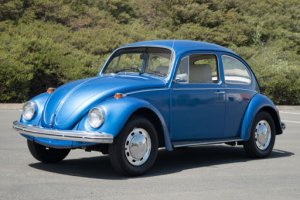
The heat in Corcoran’s Volks did not work very well, and the defroster was pitiful. He used what we all called a “hand defroster”. He placed one of his hands on the windshield to remove the fog or frost there. Then he moved the hand to an adjacent spot and peered out through the spot he just abandoned. When that hand got numb, he switched to the other hand.
Did Tom C.’s car have automatic transmission? Of course, not.
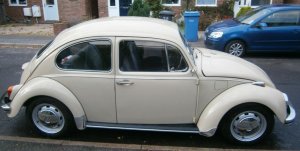
Herget’s Volks featured a fairly large hole in the floorboard in the back. Whoever sat there repeatedly had to adjust a small log that was stored there because it was roughly the same shape as the hole. Since leg room was at a premium, the rest of us were quite annoyed by this.

Jim’s Pinto seemed to be fine. It wasn’t until a few months later that the gas tanks on these models started exploding around the country.
The car pool continued after I moved to Andover. Jim Hawke, who had broken up with Leslie, took up residence in the 345 Club and assumed my slot in the car. His car was a suitable replacement for Greenie, a Chevy Nova (popularly known as “No va” in Latin America) with three on the tree.
At some point in August or September of 1973 I decided to grow a mustache. I wasn’t really too concerned about covering up the scar on my lip. Like everyone else, I was experimenting a little with my appearance. I soon realized that it made my face look more lopsided than before, and I shaved it off.
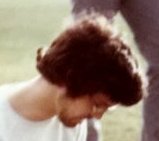
After I broke my kneecap (details are here), I let my beard, such as it was, grow. That was my look through all of my time coaching debate in Michigan and for a few years after that. History will probably call this my Jesus (with glasses) period.
I developed my famous fashion sense during my time in Connecticut. Unless I was playing a sport, I wore the cowboy boots that I had purchased in Albuquerque. When I headed outside in the winter I wore my cowboy hat and a big brown suede coat that was lined with fleece. It weighed a ton, but it was very warm.
I had to buy clothes for work. Because of the boots the pants had to be flared or at least baggy. I favored corduroy, but I also acquired one polyester sports coat. I don’t know why I bought it. Sue made me a grey wool suit. Really! I wore it once or twice, but it was too small in every respect.

For shirts and ties I usually went to my private tailor, Mr. Ruby, who selected the merchandise for my favorite retailer, Railroad Salvage. The big store on Route 5 was one of my favorite destinations. I particularly liked their selection of dress shirts. They had quality brands like Arrow, but the styles were nothing like you might see at a department store. People still wore coats and ties to work, but nothing required the attire to be overly somber. Tom Corcoran wore a string tie most of the time. Larry Abbott did not even wear a coat to work; he kept one near his desk in case he needed to go to another department.
At Railroad Salvage I also purchased several ties, including two that looked furry. The blue one was OK (although it was close to six inches at the widest point), but the brown one was obnoxious. When I wore it, it climbed around my neck until the knot was buried under my collar. I still have thirty or so ties, but I think that all that I purchased from Mr. Ruby have been discarded.
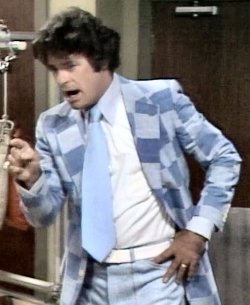
I bought a white belt from Ruby and gave it to Scott Otermat to wear to meetings with people from the Sales Department. I wanted to bring out his inner Herb Tarlek.
I never bought any tennis shoes from the big bin at railroad salvage. The shoes relegated there weren’t matched up. If you found one that you liked, you still had to hunt for its mate. You also had to be careful that you did not take two lefts or two rights.
1. It is ordinarily critically important to move to the left on this highway when you cross the bridge from East Hartford to Hartford. If your vehicle is in the right lane going west, you must start merging as soon as you cross the Connecticut River. If not, you will find yourself in an exit-only lane.
The vehicles that are exiting off of I-84 (both northbound and southbound) hoping to go west on I-84 must move to the left one additional lane. Furthermore, the drivers who have crossed the river in order to go to downtown Hartford must, at the same time, move several lanes to the right. All of this lane-changing takes place in a tunnel beneath Main St.
As bad as this design is, it was even worse in 1972. Eastbound drivers on I-84 who wanted to go north on I-91 were required to exit the highway and drive several blocks through downtown Hartford.
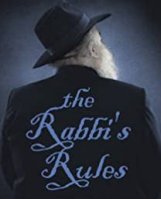
2. Mark Horton and Eric Kokish published a book about a famous bridge player who frequented the HBC, Leonard Helman. The title is The Rabbi’s Rules: Tips and Tricks to Improve Your Bridge Game. The most famous rule is “If the opponent’s king is a singleton, play your ace.” A singleton king in a bridge hand is often called a rabbi.
3. All four have long since dried up.
4. The object of Scissors is to learn how to play. All players are seated. The player with the scissors must pass them to the player on their left and announce whether they are passing them “crossed” or “uncrossed”. The leader then announces whether the pass was successful or not. If not, the player must sit on the floor. Correct answers must coincide with the passer’s own legs.
5. A Tacorral in Manchester may still exist, but Google says that it is permanently closed. It moved to a strip mall at some point. The pandemic might have been the death blow.


